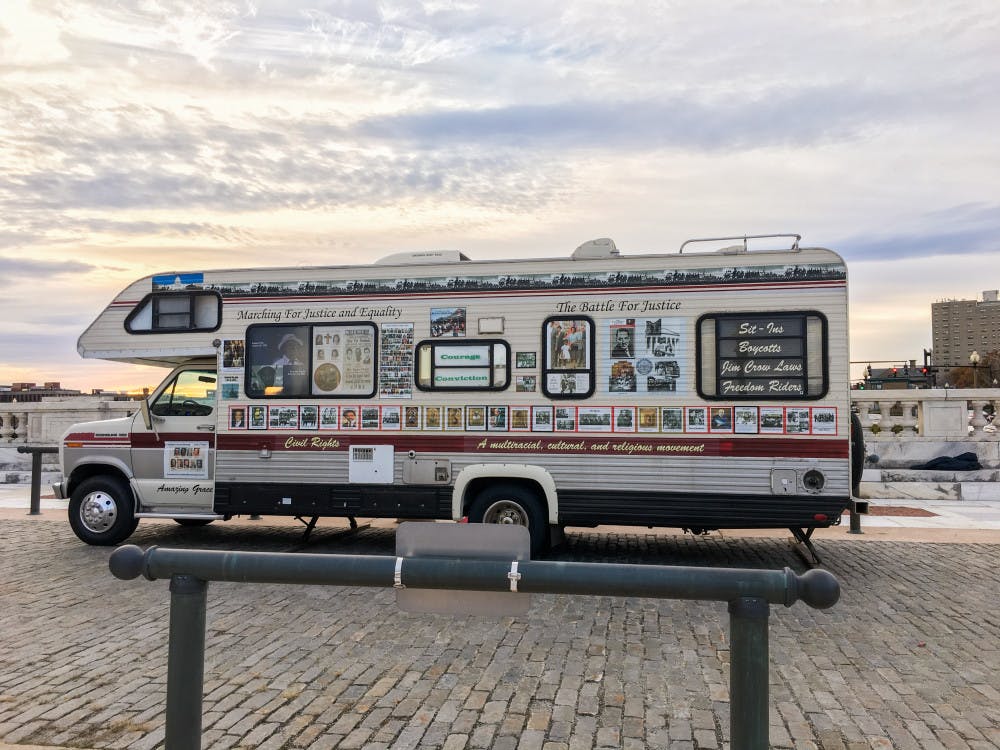Onna Moniz-John, an East Providence resident, kicked off a seven-stop tour of her exhibit, “Mobile Museum of Black Artifacts,” at the Rhode Island State House Nov. 10.
For almost 40 years, Moniz-John has been collecting artifacts related to African-American history. Her collection is now on display in her 30-foot long recreational vehicle, which she has converted into a mobile museum.
The museum follows the timeline of black history in the United States, beginning with slavery and continuing to trace important events like emancipation and civil rights. The museum also touches on the accomplishments of African-Americans in a variety of fields such as sports and music. To represent all of these topics and accomplishments, Moniz-John has hundreds of artifacts, ranging from paintings of famous African-Americans to shackles worn by slaves. Moniz-John also regularly adds contemporary content to her museum, like references to Trayvon Martin and the 2016 film “The Birth of a Nation.”
A local girl scout troop kicked off the museum’s opening stop at the State House. The ceremony was followed by the national anthem and opening words from Moniz-John and Rep. Joseph Almeida, D-Providence. “There’s a lot of work that needs to be done in this country,” Almeida said. “Black folks in our country should not be forgotten.” Afterwards, attendees were given a tour of the bus by Moniz-John herself.
Event attendees were drawn to different aspects of the museum, from the immense detail put into the bus to the personal and emotional connection they felt to specific artifacts.
“My favorite thing about the bus is the evolution of the timeline and how it starts with slavery and basically goes through all the elements of black history even up until now,” said attendee Bria Washington.
“The thing that was most heart wrenching for me was the case that has shackles that (were) actually worn by a slave,” said Rosemarie Santos, another attendee at the event and close friend of Moniz-John. “When you hold them, just the weight of them makes you wonder how they walked with them, never mind worked and traveled,” she said. “It’s a bittersweet experience going through there. I’m so glad that she’s done it.”
Moniz-John originally started collecting artifacts tied to African-American history after searching for a black doll as a child. “I grew up looking for a black doll, and when I started seeing all these knickknacks and figurines, I just was drawn to them, so I just started buying them and collecting them,” Moniz-John said. “It got out of control.”
Now that her museum has garnered media attention, Moniz-John no longer needs to seek the artifacts out, as people often bring things to her for the exhibit.
Moniz-John hopes that her museum will educate both African-Americans and individuals of other races so that everyone can address issues of race. This sentiment is conveyed in her mantra, “together we can face race.”
Furthermore, Moniz-John hopes to bring attention to current injustices. Part of addressing these historic injustices, Moniz-John said, is changing the official name of Rhode Island — “State of Rhode Island and Providence Plantations.” Monitz-John wants to remove “and Providence Plantations.”
Moniz-John will next take her mobile museum to Connecticut, followed by stops in New York, New Jersey, Pennsylvania and Maryland before finally ending in Washington, D.C. Moniz-John plans on parking her bus in front of the White House since “the first black president is there,” even though she does not have clearance to do so yet.
“I don’t see any reason why I can’t take my bus,” Moniz-John said. “I’m going regardless.”





